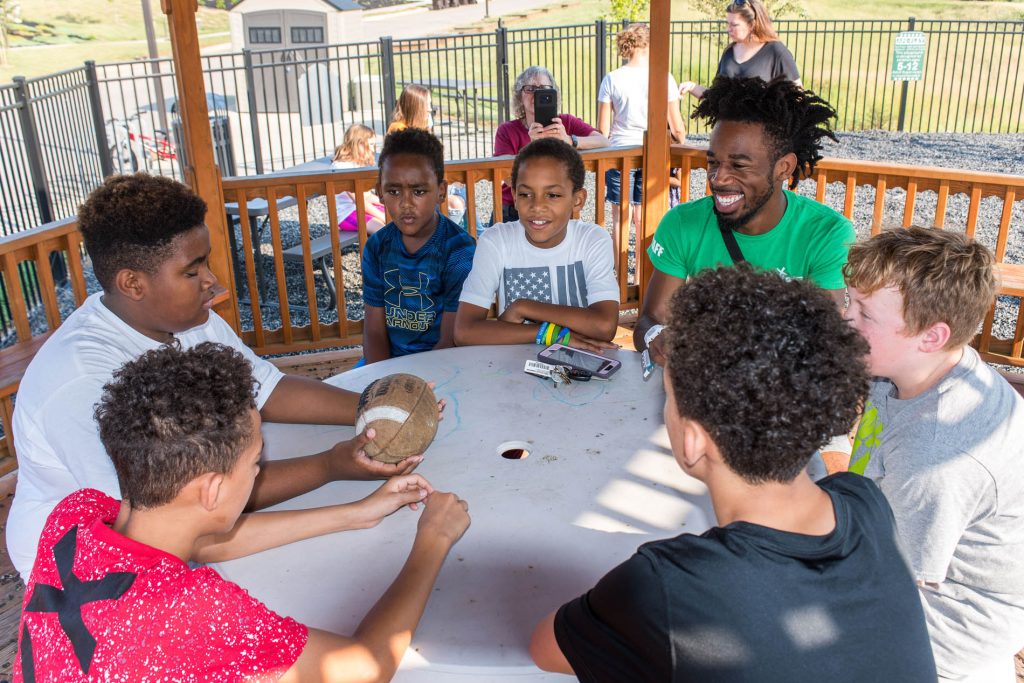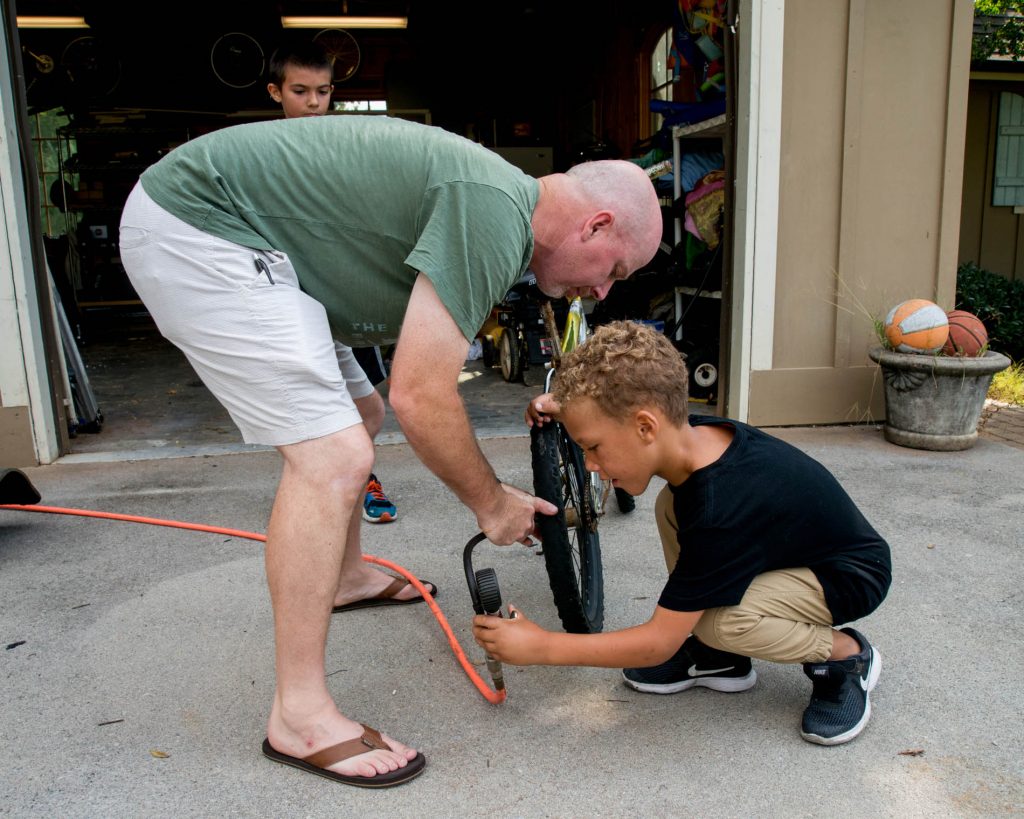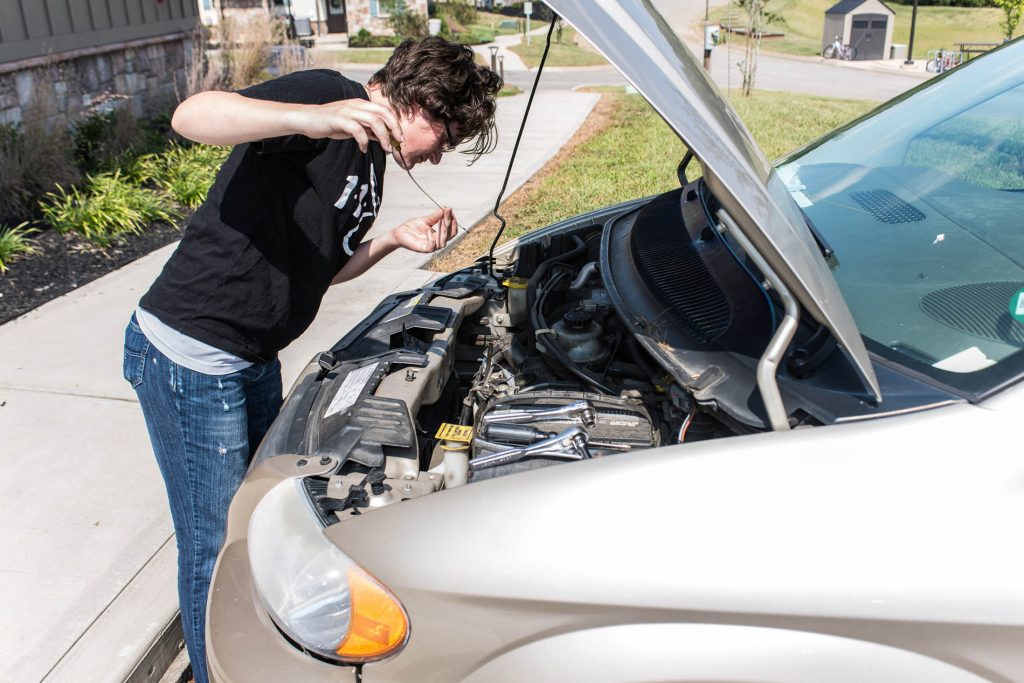Restoration House provides support and kinship for single moms
It was the summer of 2005 and a small group of adults from an East Tennessee church sat together indulging in an ice breaker. “If you could do anything with no boundaries, what would you do?” the group was asked. One by one participants shared their dreams. Eventually it was time for the final person in the group, Mandy Watson, to share: “I would buy a piece of property, adopt a bunch of kids, and run a ministry for single moms out of my home.”
No one was more surprised to hear this dream than Mandy’s husband, Daniel, who sat beside her. After all, the two had their dream jobs—she a teacher, he on staff at a church—and they had just purchased their first home and adopted their first child. With a picket fence and golden retriever in the yard, they were happy with their lives. But after Mandy verbalized her dream, she couldn’t let it go, and Daniel, though surprised to hear it that night, couldn’t let it go either.
As the couple headed to church the next morning, they spotted a “For Sale” sign on the lot directly behind their home that they hadn’t seen before. It included roughly three-and-a-half to four acres of land and three homes. “By the time church was over, I was like, ‘Daniel, I think we need to talk about something,’” Mandy recalls. “That Sunday we looked at the property on our own, and by Friday we had a contract.”

Two months later, they purchased the property and began planning. “It wasn’t anything more than this mom-pop family thing that we were going to do,” Mandy says. But with a growing family, a new property, and a vision, they spent the next two years in research and development, identifying the services and gaps that existed in Knoxville for lower income single mothers.
The research continued as they identified organizations across the country succeeding in similar work. And with a hope to make an impact in their community, they married the best of what the organizations were doing and launched The Restoration House of East Tennessee in 2007, ready to support single moms.
Today, Daniel leads the organization as executive director. Mandy remains heavily engaged as somewhat of a visionary consultant, helping everywhere from top down leadership to working with the children. They still live right at the campus, too, so the staff, mothers, and work remain part of their everyday lives. “We’ve always lived in the context of the work,” Daniel says.
This work hits close to home for the Watsons. The two came from “both sides of the single mother coin,” Daniel says. Married, divorced, and remarried six times beginning when she was 15, Daniel’s mother was constantly on the move. “We had a lot of chaos in our home,” he says. “We moved at least once a year, every year, so growing up we had no sense of place.” Mandy’s parents divorced when she was young, though her father remained involved. While her mother stayed single for the next two decades, Mandy and her family had a community of support. “[She grew up] in that kind of place where people tend to take care of one another,” Daniel says.
Both were loved by their mothers, but what separated their experiences was that Mandy’s family had the support to succeed. This aspect became the foundation on which Restoration House was built. “We weren’t designed to live life alone,” Daniel says. We were designed to live life in the context of community…It’s really about journeying with families.”

The organization approaches work with families from the perspective of four key relationships: with the self, with other people, with the things you steward (such as time, money, possessions, or talents), and—for those who choose—with God. “Each family’s in a very different place in those relationships, and we don’t presume to know where they’re at or where they’re trying to go in those relationships,” Daniel says, so they meet moms where they are and journey from there.
The organization supports the growth of the four relationships through three programmatic sectors: supportive housing, ally teams, and family advocacy. Daniel says the housing piece is the most regulated of what they do, but it’s important to “help create the environment for change.” When families apply, they can live in one of the 28 homes in the organization’s “Village” for up to three years. Some may pay as little as $50 for their housing, but they always have “skin in the game,” Daniel says. This reciprocity is one of the organization’s core values.
In addition to housing, the organization provides social and emotional support through ally teams. “What we believe is that the way you leverage knowledge and skill is through human relationship,” Daniel says. Communal elements of the village, such as walking trails, playgrounds, and gardens, also foster connection.
The organization’s work in family advocacy then helps moms develop knowledge, new skills, and important connections in the greater community.
Twenty community partners help in this realm. The partnership with Harmony Family Center, for example, allows Daniel and his team to weave therapy into a family’s time at the Village, helping them overcome past trauma. The YMCA provides free memberships. Car dealers in the region help families access transportation at reasonable prices. And Emerald Youth Foundation is right on site providing youth development work, as 50 of the 80 people living in the village right now are children.

Roughly 75 percent of the mothers end up going back to school while in the program, and there are even scholarship funds they can apply to. The organization additionally works with families to set up “max savings accounts” or “individual development accounts” where the families save money of their own that is matched by the Restoration House and its community of supporters. “Economic poverty is not just lack of income; it’s lack of asset,” Daniel says. “We want to help families gain assets that increase in value.”
For smaller financial strains during their stay, such as needing help paying for a couple months of car insurance while the mother secures a job, the women can apply to the Family Assistance Fund. “Families can access up to $450 per year in small dollar amounts that help them overcome short term financial barriers to long term financial gain,” Daniel says.
Some of the mothers also have the opportunity to purchase a vehicle while in the program. Vehicles that are donated to the organization are fixed up, inspected, then sold to a family at a rate they can afford. The money then goes back into fixing other donated vehicles that will eventually make their way to moms. “So then the families are just investing back in one another,” Daniel says.
Chasity Johnson entered the program in 2012. With a new baby, Johnson was in search of stable housing. She also had other children she was working to regain custody of. “I just thought that they would be a resource and another set of eyes in regards to my situation,” she says, “…but it was an even better situation than that.”
At Restoration House, her children could come to visit and she could raise her newest. “It just helped take the strain off as I was trying to do everything, especially not having a huge support system,” she says. Johnson had already been taking college classes, but she eventually ending up in LPN school while there. “I always wanted to be in healthcare,” she says. “I was a CNA for nine years. So it was something that I enjoy, helping people.”
Her Restoration House family advocate eased her stress a little bit more by helping her navigate the legal process of regaining custody of her children. And having an ally team ready to help, whether it was in dropping off a meal or babysitting, made the journey easier. Amidst all of this were classes on budgeting and parenting, as well as group therapy sessions where she learned important coping skills.
Johnson stayed in the program for roughly two-and-a-half years, leaving after she finished school. “I felt like I was ready,” she says. “I had graduated LPN school. I was working, so I felt like I was financially stable.” Today, Johnson continues work as an LPN. Her oldest child now is 22. And her connection to the Restoration House remains.
Johnson is just one example of the women that the Restoration House team walks alongside each year. And there is a sense of empowerment that comes to mind when hearing about how the organization approaches how it supports them. The focus is on helping single moms “mitigate barriers,” Daniel says.
Each year, with a staff of 10—but a partner team of many—the organization walks with 22 families at any one time, helping them regain their footing as they journey on the road to stability. And for the Watsons, it’s been like watching a dream unfold.
“It’s kind of overwhelming and humbling,” Mandy says of how far the organization has come. “But it also gives me hope for what’s next. That if something that started small like this can grow, then what is even more possible from here?”
To learn more about ways to become involved with The Restoration House of East Tennessee, readers can visit www.therestorationhouse.net.

Comments are closed.